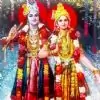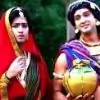Originally posted by: Brahmaputra
Panchaali Urubhangam is a very famous Sanskrit drama on Dury. There is also another very famous Sanskrit drama on Karna, by the same author, Karnabharam (the burden on Karna). These plays (11 or 13) in total are the first of their kind. They were written by the great poet Bhasa. Based on the language used, his date is supposed to be around 5th century BC. Unlike other Sanskrit poets, Bhasa wrote works more on tragic characters who are usually considered as grey or negative by many, brilliantly explaining inner layers of their mental disturbances, confusions and uncertainty! As I'm too lazy to type more, just doing copy paste of the gist of the drama from wikipedia.😆
Urubhanga focuses on the story of the character Duryodhana during and after his fight with Bhima. Although Urubhanga contains the same core storyline as that in the Mahbhrata, Bhasa's altering of certain aspects results in a different presentation of the story. The most extreme of these altercations is Bhasa's portrayal of Duryodhana, who, in the Mahbhrata, is viewed as a villain, but in Urubhanga is given more human qualities. While tragedy is rare among Sanskrit dramas, Bhasa's presentation of Duryodhana's side of the tale adds certain tragic elements to the play.
Although portrayed as a villain in the original play, the protagonist Duryodhana is presented in a different light in Urubhanga. He isn't exempted from his original evil deeds, but he is shown as a character with heroic qualities. The play centers around events that happen preceding his death; Duryodhana is shown repenting his past, reconciling with his family, and realizing the futility of war. In the beginning of the play there are three soldiers that are marveling at the battlefield between the Kauravas and Pandavas. They describe the scene before them in gorey detail, each taking turn to muse and exclaim over the various details that they observe. As they progress through the battlefield, they arrive to the battle between the middle Pandava Bhima and the Kaurava Duryodhana.
The soldiers then proceed to describe the fight between Bhima and Duryodhana. The audience is seeing the battle entirely through the description of the three soldiers; ultimately, Bhima falls from Duryodhana's incessant blows. Duryodhana, refusing to kill Bhima while he is on the ground, instead has his thighs crushed by Bhima from false play and violation of rules. After Duryodhana has fallen, Bhima is carried away hurriedly by the other Pandavas, and Duryodhana is left on the battleground. This act of false play incites the anger of Balarama, who wants to seek justice.
However, Duryodhana stops him, having become resigned; this begins the part of the play that starts to emphasize the heroic qualities of Duryodhana.
Duryodhana blames Krishna and forgives Bhima, as the play progresses, he is reconciled with his blind parents, then his queens, and his son. Duryodhana is distressed about his situation, as he can no longer salute his father, nor can he let his son sit on his thigh. He also rejects the futility of war.
At the end of the play, Ashvatthama appears with the intent to seek revenge for Duryodhana and kill the Pandavas during the night, and Ashvatthama names Durjaya, Duryodhana's son, as king of the kingdom right before Duryodhana dies.
However, it needs to be noted that the play does not end completely in a tragic note, as there are signs of hope for the future, since it is unorthodox for Indian Sanskrit dramas to end only on a sad note.
PS- Karnabharam is more emotional and highly tragic in nature. It is a must read for Karna lovers.



























